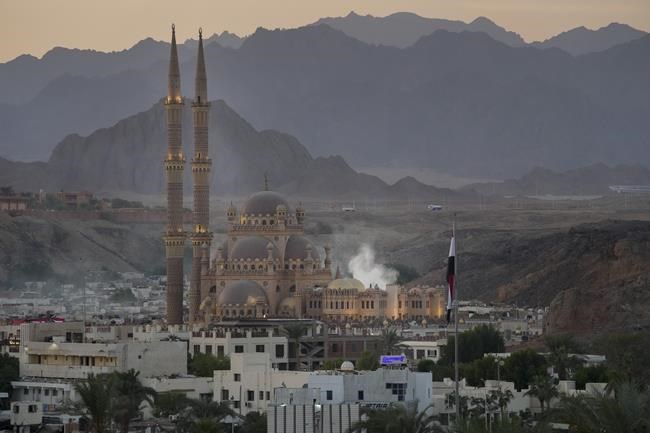
The sun sets over Al Sahaba mosque in the old market in Sharm el-Sheikh, Egypt, Friday, Nov. 4, 2022. Sharm el-Sheikh will host the COP27 UN Climate Summit starting on Nov. 6. THE CANADIAN PRESS/AP Photo/Peter Dejong
November 05, 2022 - 1:00 AM
SHARM EL SHEIKH, Egypt - First Nations leaders from British Columbia are taking their environment and climate policy pitch directly to the international stage at a United Nations climate conference in Africa in an attempt to set a tone for domestic climate policy.
Leaders of the First Nations Climate Initiative, made up of four B.C. First Nations, say they will leverage their invitation to COP27 to reiterate the climate action plan it presented to the provincial and federal governments in September.
Alex Grzybowski, a facilitator for the First Nations Climate Initiative, said one of their key goals among seven policy proposals is to reduce poverty in First Nations communities by implementing innovative climate policies.
"There's an extraordinary opportunity to achieve reconciliation objectives, as we decarbonize," Grzybowski said. "Decarbonization and decolonization are part and parcel of the same thing."
First Nations want an opportunity to be part of that rebuilding to meet climate change goals, he said.
"If we were to decarbonize and (nations) were still marginalized, it would be just recolonization."
He said it's no longer enough to have Indigenous representation in decision-making. Instead, he said, policy ideas from Indigenous communities should be "fundamental" to all resource and energy decisions.
More than 120 world leaders are expected to attend the two-week Conference of Parties 27, or COP27, starting Sunday in Sharm el-Sheikh, Egypt. A focus will be cutting greenhouse gas emissions and boosting financial aid for poor countries struggling with the impacts of climate change.
Grzybowski said the group had not initially set its sights on presenting on the global stage but it makes sense because they're all trying to achieve the same objective.
"It's about working collaboratively with jurisdictions around the world, (and) with Indigenous people around the world, to try to mitigate and adapt to climate change, and recovering the climate. That's the principle purpose of being here."
The conference objective is for countries to negotiate global goals for tackling climate change, present their individual plans for contributing to those goals and report on their progress.
Grzybowski said he hopes to network and collaborate with other political and Indigenous leaders during the event to find innovative solutions to the crisis.
"We have to think globally as well as locally, and we have to act globally as well as locally," he said. "(First) Nations want to develop relationships with other countries. You're not going to develop those relationships if you're not out there meeting people."
Candice Wilson, environmental manager for the Haisla Nation, agreed, saying her main goal of attending the conference is to "information share" with political and Indigenous leaders from around the world.
"This will give us the opportunity to showcase the work that we're doing in our traditional territories and how ecosystem restoration is our key driver in taking part in nature-based solutions projects."
The First Nations Climate Initiative was chosen by the federal government to join its delegation at the conference. It is scheduled to make a 45-minute presentation at the Canadian Pavilion on Tuesday that Grzybowski said will focus on three key areas: nature-based climate solutions, new energy systems and the importance of Indigenous leadership.
This year marks the 27th Conference of the Parties. The parties are the 198 nations, including Canada, that agreed to the UN Framework Convention on Climate Change.
The purpose of the convention is to stabilize greenhouse gas concentrations and the United Nations says the onus rests on industrialized countries because they are the source of most greenhouse gas emissions.
Under the convention, developed countries agree to share technology and support climate change activities in developing countries by providing financial support for action on climate change.
— By Brieanna Charlebois in Vancouver.
This report by The Canadian Press was first published Nov. 5, 2022.
News from © The Canadian Press, 2022